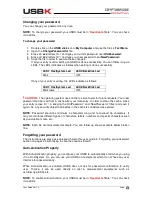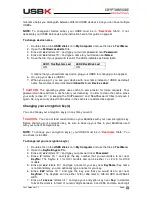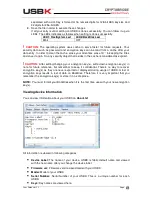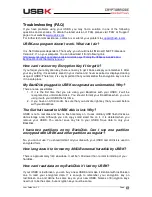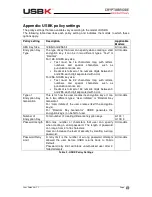
User Guide Ver:1.1 Page:
49
Appendix: USBK policy settings
The policy settings that are available vary according to the model of USBK.
The following table describes each policy setting and indicates the models to which these
options apply.
Policy setting
Description
Applicable
Models
AES Key Size
128-bit and 256 bit
All models
Encryption Key
Type
The type of key that user can specify when creating a valid
encryption key. It can be in two different types: “Text” or
“Decimal”.
For 128-bit AES key size;
•
Text must be 16 characters long with letters,
numbers and special characters such as
punctuation marks, etc.
•
Decimal is formed of 16 numeric digits between 0
and 255, each digit separated with a dot.
For 256-bit AES key size;
•
Text must be 32 characters long with letters,
numbers and special characters such as
punctuation marks, etc.
•
Decimal is formed of 32 numeric digits between 0
and 255, each digit separated with a dot.
All models
Type of
Encryption Key
Generation
This is for how the user creates its encryption keys. It can
be in two different types: “User initiated” or “Random Key
Generator”.
For “User initiated”, the user creates itself the encryption
key(s).
For “Random Key Generator”, USBK generates the
encryption key(s) on behalf of user.
All models
Number of
Encryption Key
Total number of creating different encryption keys
A101: 1
A103: 3
Password Length Min.-max. number of characters that user can specify
when creating a valid password. The length of password
can range from 4 to 16 characters.
User can increase the level of security by creating a strong
password.
All models
Password Retry
Limit
A retry limit is the number of wrong password attempts
allowed the user before USBK returns back to Fabric
Default.
Password retry limit will block unauthorized user after 3
failed attempts.
All models
Table 2 - USBK Policy Settings








